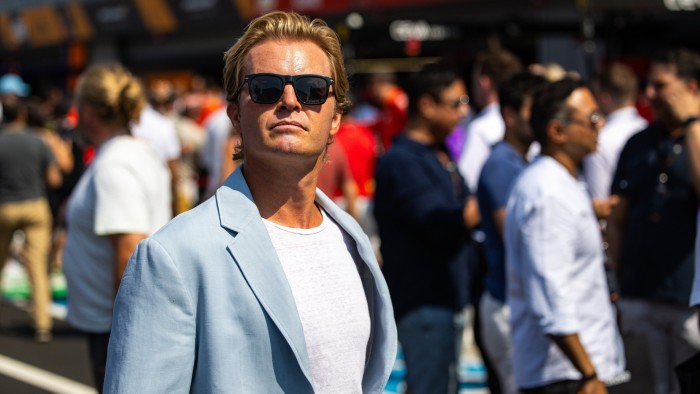When the Las Vegas race weekend gets under way, scores of fans will inevitably be lured in by the city’s bright lights to gamble their money away in its many casinos. Nico Rosberg, in contrast, will be looking to create wealth.
The 2016 Formula One champion will host around two dozen guests in the hospitality suite of Mercedes — his former team — to discuss their plans for investment. The 39-year-old German, who shocked fans when he retired from the sport only days after winning the title ahead of teammate Sir Lewis Hamilton, has built a career outside the sport as an eco investor.
Rosberg Ventures, a venture capital fund of funds the former champion launched this year, has raised more than $100mn from wealthy families and investors to deploy with investment firms, including Andreessen Horowitz, Accel and Kleiner Perkins.
“In F1, I learnt to move fast, make fast decisions and occasionally break things,” Rosberg says. “In venture capital, that’s how you get from $0 to $100mn in such a short space of time.”
Speaking to the FT via a video link from his wood-panelled offices in Monaco, Rosberg talks enthusiastically about life after leaving the sport. He is one of a number of former F1 drivers who, having either walked away from or lost their seat at the pinnacle of motorsport, have branched out into the world of financial services.
He had built a reputation during his F1 career for using his technical nous to help boost his performance on the track. After leaving the sport, he switched this analytical drive to slowly get his head around the world of finance.

Early in his retirement, Rosberg was directed by Swiss Bank UBS to build a vanilla portfolio including equity, bonds and real estate before he branched out into angel investing and venture capital — becoming involved in funding rounds for Airbnb, Lyft, and SpaceX when they were start-ups.
Rosberg now has a small team of six people running his venture fund, which has turned into a full-time job for him as he manages part of the family wealth of some of Germany’s leading industrialists.
Louise Johnson, chief executive of sports marketing agency Fuse, says that, as F1 has grown rapidly over the past decade under the ownership of Liberty Media and began to capitalise on its global reach, drivers have broadened their horizons in terms of careers after leaving the sport.
“The traditional route for drivers in the past was to commentate, become a brand ambassador, race in another series, or even buy a team,” she explains. “But a new generation is seeking other opportunities.”
F1 is ruthless and drivers rarely have an opportunity to dictate the length of their career. In the past season alone, two drivers have been dropped with several races left to run due to poor performances, and several others will move on at the end of the year having not had their contracts renewed.
“As a young driver, you have to deliver straight away or you’re out — there’s 10 other drivers waiting in line,” Rosberg says. “Look at [Franco] Colapinto,” he adds, referring to the Argentine driver who replaced American Logan Sargeant at Williams in the middle of the season. “This is his one opportunity [to deliver] and there’s probably never going to be another one.”
The pressure cooker of F1 and the sheer focus demanded of drivers during their career leaves many unprepared for what comes next. But it can also provide a moment of clarity.
Not long after being let go midseason by the then AlphaTauri team in 2023, former Red Bull junior driver Nyck De Vries says a chance meeting with Mercedes F1 chief Toto Wolff in a coffee shop in Monaco led him to Harvard, to take an executive leadership course, after the former banker advised him to plug some of the gaps in his CV.
“I was hurt and hoped it would work out differently,” the 29-year-old Dutchman says. “But, in our industry, there is no certainty and you can’t take anything for granted. You’re only as good as your last race. I tried to quickly regroup, reset, and look ahead.”
He is part of a generation of drivers who left mainstream education early to focus entirely on their motor racing career, leaving little scope for any kind of fallback plan.
De Vries’ says the Harvard course was instructive and helped him broaden his horizons even though he subsequently returned to motorsport as an endurance racing driver with five-time Le Man winners Toyota, and to Formula E with Mahindra Racing.
“Going up the ladder to F1, everything is centred around racing and maximising your career,” he points out. “When you’re doing 24 race weekends in a year, the time you have available to explore other things is non-existent. The time [out of the sport] allowed me to explore.”
Shortly after De Vries was dropped from F1, another chance encounter with Serge Savasta, chief executive of Omnes Capital, which manages €6bn in assets and specialises in green transition investments, piqued his interest in private equity.
De Vries, who developed an interest in green investments during his first successful spell in Formula E at that start of the decade, has worked with Omnes to develop an “accelerator programme” that can help other professional sportspeople learn about private equity.
“I want to race for as long as possible,” he says. “But, in order to stay relevant in the future, I’ve developed an interest in business.”
Rosberg still remembers feeling scared during his first few months after leaving F1: “I didn’t know what was coming next,” he says. “It wasn’t until five years ago, that I finally understood where I needed to be going . . . Now I know exactly.”
https://www.ft.com/content/d04e9a39-9c16-4949-a190-d2d8f07b1e35


